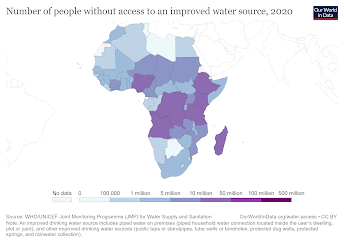It's natural, get over it!
Hello
again!
Following last week’s post on World Toilet Day and the importance of adequately managed and safe toilets, as a woman I feel it is only right to discuss the matter concerning women and sanitation. I will be using a gendered lens to examine the ways in which young girls and women are disproportionality affected by the vulnerable and fragile sanitation services in sub-Saharan Africa.
Despite menstruation being a natural process, a taboo surrounding periods is still prevalent in many countries across the world particularly the global South. Sub-Saharan Africa has one of the fastest growing teenage girl populations, most of which have or will experience menstruation (Ssewanyana et al. 2017). The stigma that exists around the topic of periods has led to negative attitudes and misinformation, having a negative impact on the dignity of these women. It is common across cultures in Africa for a woman who is on her period to be excluded from doing everyday activities such as cooking, cleaning, and socialising (UNFPA 2018). This shame associated with periods also goes to the extent where a menstruating woman cannot even sleep in their own home or bed (UNFPA 2018).
There is a plethora of evidence showing that menstruation management issues have a significant impact of the livelihoods of girls and women in underdeveloped countries. Not having access to adequate sanitation services and sanitary products has negative effects on girls' education. 1 in 10 school-aged African girls do not attend school during menstruation because of inadequate toilets, discomfort, and lack of sanitary products (UNFPA 2018). Further concerns raised by school girls in Kenya included the fear of being 'stigmatised' by other girls, or sexually harassed by boys (McMahon et al. 2011). McMahon et al. (2016) also found that boys within the class make girls feel ashamed by teasing them about being on their periods due to ignorance and lack of education about the topic.
Inadequate menstruation management and sanitary provisions has subsequent impacts on a girl's health. In some societies, the start of menstruation is a sign of adulthood and maturity which is commonly associated with being ready for marriage, particularly for girls from poorer households as the financial responsibilities are then passed onto the husband. This commonly leads to child marriages and early pregnancies leading to increased risks of STIs and negative impacts on sexual and reproductive health (UNFPA 2018). Additionally, the high costs of menstrual products places these young girls in desperate and comprising positions. Some young girls resort to transactional sex in order to pay for menstrual products, increasing their risk of HIV, pregnancies and further socioeconomic challenges (UNFPA 2018).
Despite
women being at the brunt of implications of poor WASH facilities, they are
still excluded and not given the opportunity to give their opinions on WASH
projects. There is an urgent need for policy makers and stakeholders to create
an open forum for consultations to discuss
and facilitate appropriate menstruation and sanitation facilities across low-income
areas in Africa to help combat the disadvantages placed on women and girls due
to something they have no control over.



Comments
Post a Comment